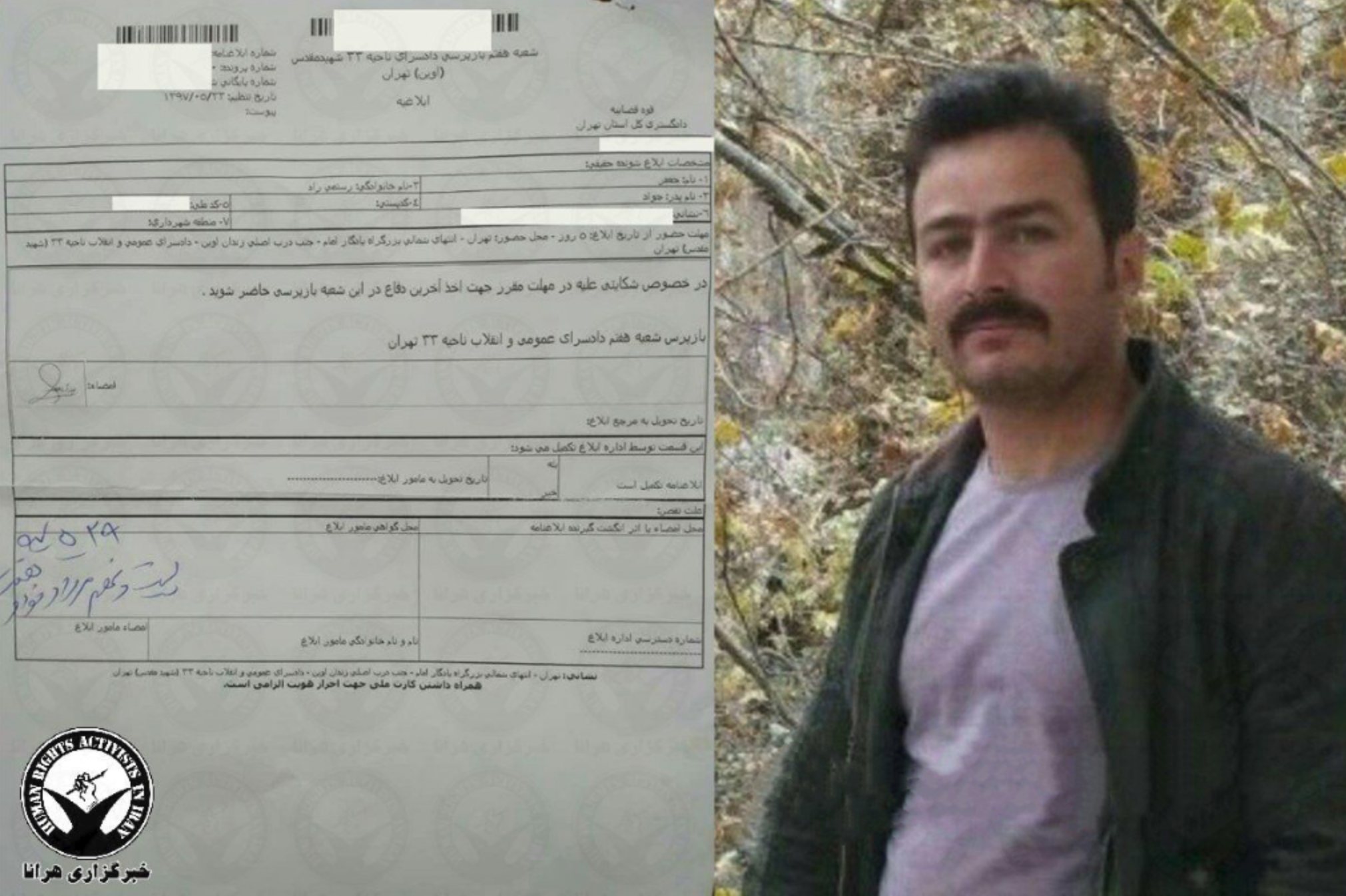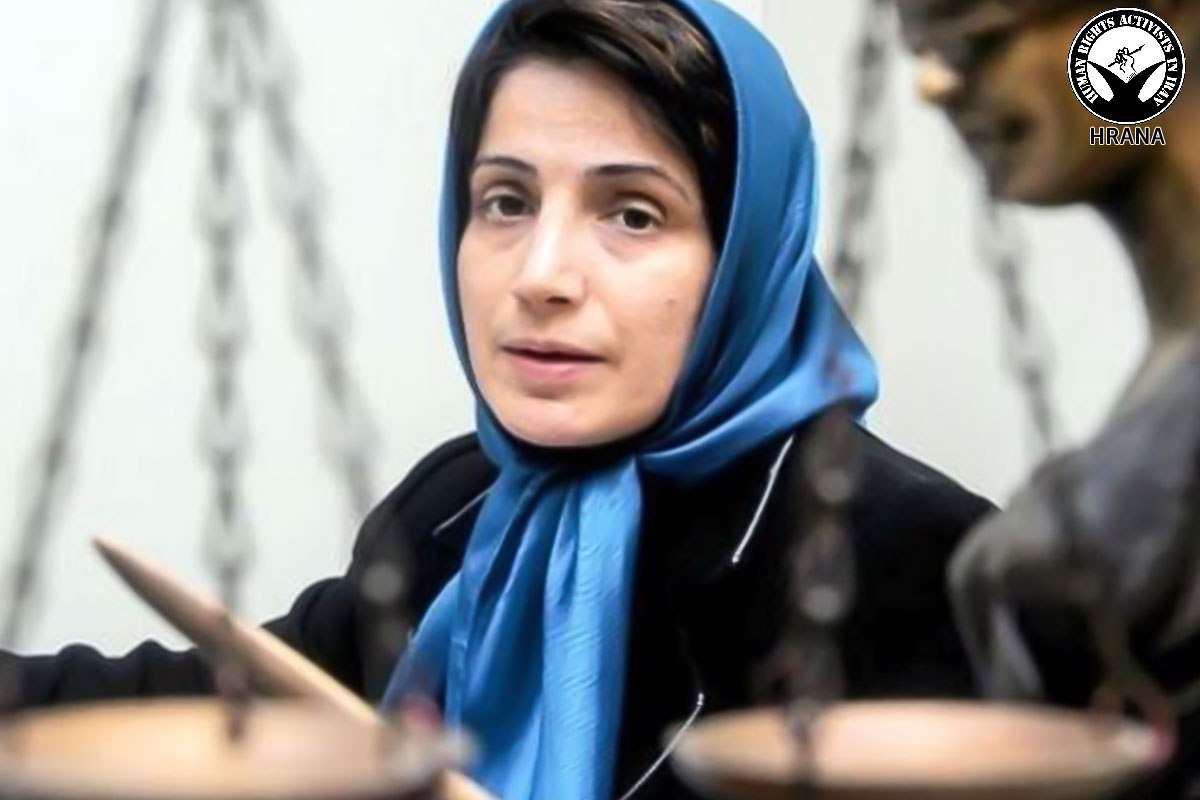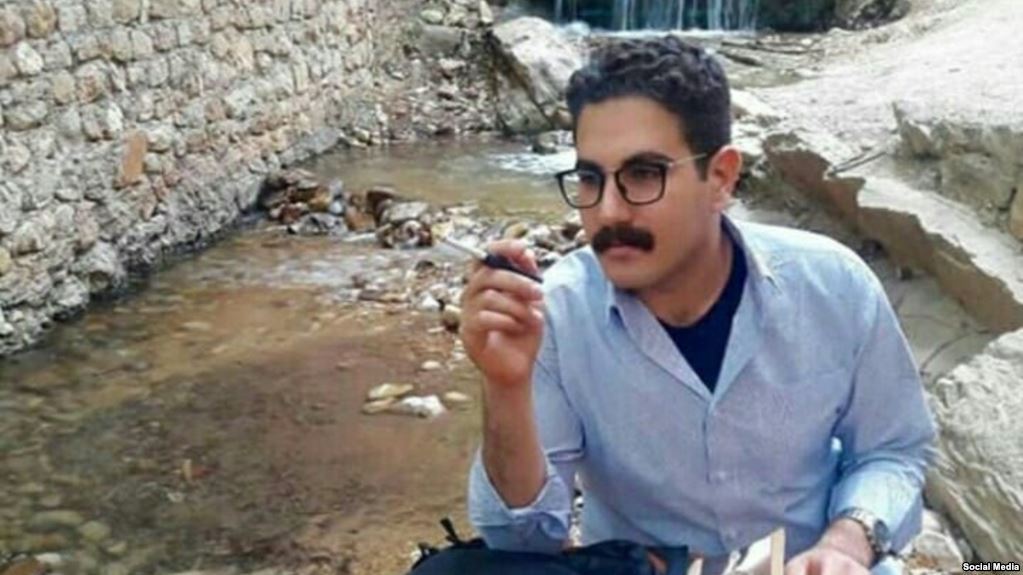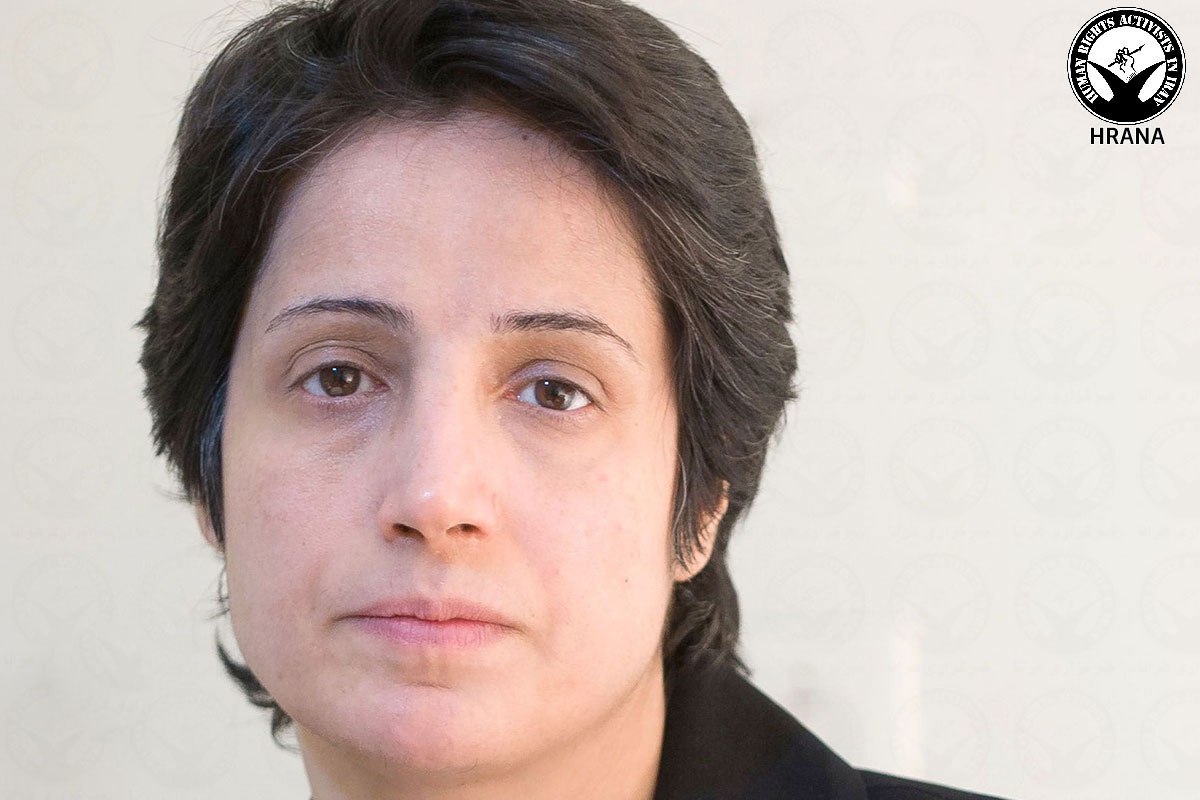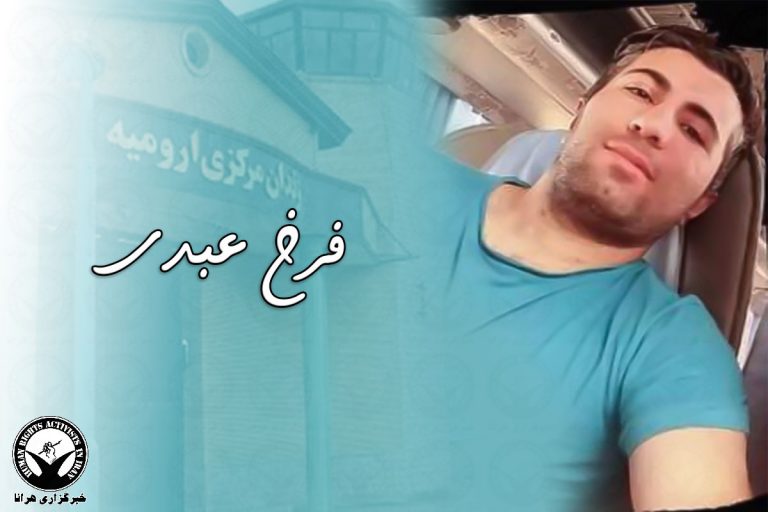Human Rights Activists News Agency (HRANA) – Jafar Rostamirad, an Azerbaijani Turkic minority rights activist, has been summoned by Branch 7 of the Prosecutor’s Office, based in Tehran’s Evin Prison, for the last round of his defense statement. He has been given five days to go to the Prosecutor’s Office, a credible source told HRANA.
Rostamirad was arrested on July 2nd by plainclothes security forces in Tehran who did not present a warrant. His arrest was in connection with the Babak Fort gathering that occurred on the same day. After spending seven days in solitary confinement, he was sent to Ward 209 of Evin Prison and charged with “Propaganda against the regime”. He was released on bail on July 31st.
From the *Babak Fort arrests on July 2nd, Ebrahim Noori, an Azerbaijani Turkic minority rights activist, is the only one who remains in prison. He is held in Ward 209 of Evin Prison.
Rostamirad had previously been arrested on February 21, 2015, after taking part in a private meeting to commemorate International Mother Language Day.
—
*Babak Fort, a monument built during the pre-Islamic Sassanian period, is named after Babak Khorramdin, known for leading an uprising against the Abbasid caliphate in 893. In recent years, it has become a place of symbolic gatherings for Azerbaijani activists, especially during the annual commemorations in the first week of July.
Tag: prisoner of conscience
Azerbaijani Activist Arrested and Transferred to Sarab Prison
Human Rights Activists News Agency (HRANA) – Seyed Jamal Moosavinejad, an Azerbaijani Turkic minority rights activist from the city of Sarab, was arrested by security forces on the morning of August 25th and taken to Sarab Prison to start his one-year sentence, a credible source told HRANA.
Last May, Moosavinejad was convicted of “Propagating against the regime in favor of partisan ethnic and separatist groups” which led to a suspended prison sentence of one year. Branch 26 of the East Azerbaijan Appeals Court, presided by Judge Mikayil Khoobyarpour, upheld the sentence.
The court cites the following activities as the reasoning behind Moosavinejad’s conviction: issuing statements on social media; reflecting anti-regime and ethnic activities in foreign media; respecting and kissing of a flag belonging to an alien country due to ethnic beliefs in contravention of the Islamic Republic of Iran; praising the Azerbaijani events of 1945 and praising their founder, Jafar Pishevari; confessing to engaging in ethnic activities on Telegram.
Moosavinejad had also been charged with “Insulting the Supreme Leader” but was acquitted of that count.
Seyed Jamal Moosavinejad was first arrested in February after security forces raided his house. His phone, laptop, books and papers were confiscated at the time. He was released on a four billion rial [apprximately $40,000 USD] bail. According to Moosavinejad, he was insulted and humiliated by security forces throughout the process of arrest, being charged, and the initial court and appeals hearings. Furthermore, he had previously been arrested in Sarab in the summer of 2012, together with several other citizens.
Nasrin Sotoudeh Starts Hunger Strike in Evin Prison
Human Rights Activists News Agency (HRANA) – Nasrin Sotoudeh, prominent lawyer and human rights activist, who has been detained in Tehran’s Evin Prison since June 13th, started a hunger strike on Saturday, August 25th.
Sotoudeh has published an open letter to declare her hunger strike. The arrest and harassment of her family members and friends is the reason behind her protest, she says in the letter.
Sotoudeh’s husband, Reza Khandan, published a note to confirm his wife’s hunger strike.
The full text of Nasrin Sotoudeh’s letter, translated by HRANA:
My fellow Iranians,
After I was arrested two months ago, agents of the Ministry of Intelligence undertook the unlawful action of arresting the esteemed citizen, Dr Farhad Meysami. They searched his house and that of his relatives and friends to discover evidence of protest against mandatory veiling.
After they failed to find anything in the house of my husband’s sister, they confiscated a satellite device [instead].
Since none of my correspondences to the authorities has been so far responded to, I have no choice but to embark on a hunger strike to protest against the arrests and judicial pressures brought upon my family, relatives and friends.
In the hope that law and justice will one day prevail in our beloved country, Iran.
Nasrin Sotoudeh
August 2018
<b> —- </b>
Nasrin Sotoudeh had recently refused to appear in court, despite a summons order issued by the authorities. She wrote an open letter to explain why.
According to a report published by HRANA on August 18th, Reza Khandan’s house and the house of other relatives and friends of the family were raided by the authorities.
<b> *** </b>
<h3> UPDATE: </h3> Nasrin Sotoudeh ended her hunger strike on October 3, 2018, her lawyer Mohammad Moghimi told HRANA.
Writer Nader Faturehchi Decries the Plight of “Ordinary” Inmates at Great Tehran Penitentiary
Human Rights Activists News Agency (HRANA) – Released on Monday, August 20th after spending one day in the Great Tehran Penitentiary, writer, translator, and journalist Nader Faturehchi was moved to publish a post on Facebook about the miserable conditions of the prison’s quarantine ward.
Having been arrested the day before, Faturehchi was sent to the Great Tehran Penitentiary (also known as “Fashafoyeh”) when he was unable to post bail, HRANA reported. He was arrested pursuant to charges brought by Mohammad Emami, who himself has been charged with embezzling money from a pension fund for teachers.
Summoned to answer to Emami’s accusations on August 19th, Faturehchi wrote, “A serious battle with corruption has begun. I’m going to court, coerced to ‘explain myself’”.
Born in 1977, Faturehchi writes on politics, art, social issues, and philosophy.
Below is the translated text of his post:
I had a very short stay in Fashafoyeh Prison.
I write here not to describe “personal suffering”, but to deliver on a promise that I made to the inmates of the quarantine ward.
All that’s worth saying about myself is that I “went” to Fashafoyeh Prison; the judge had insisted I go to Evin [Prison], but I was transferred to Fashafoyeh instead. Unbelievably, prisoners are made to pay their own transfer costs (if they can afford it), and naturally the fee for a transfer to Evin (150,000 rials) [about $1.50 USD] is “considerably” different from the fee for a transfer to Fashafoyeh (1,000,000 rials) [about $9.50 USD].
At any rate, the greed of police agents afforded me a glimpse into the conditions of Fashafoyeh’s quarantine or “drug offenders” ward.
Among inmates, the colloquial name for the quarantine ward is “Hell”.
The accused, the convicts, the inmates awaiting transfer, or any other kind of “client” will spend four days in the quarantine ward before transfer to a ward known as “the tip”.
The prisoners said the difference in living conditions between the tip and quarantine wards are analogous to those between a bedroom and a toilet.
Having witnessed the quarantine ward on three different occasions in the 90s and 2000s, I can definitively corroborate their accounts of how “grave” the conditions in Fashafoyeh’s quarantine ward really are.
In a routine four-day quarantine period, the prisoner, no matter their crime or sentence, is deprived of potable water, ventilation, toilets, cigarettes, and digestible food (there is cold, half-baked pasta, and cold, uncooked yellow rice).
Fashafoyeh, designed for drug addicts with limited mobility, doesn’t have a public toilet. The toilet is a hole on the floor of a 2X2 foot area without light or running water, separated by a curtain from the ward’s beds and 10X10 foot cells, known as “physicals,” that house between 26 and 32 prisoners. The living conditions in the physicals are so inhumane that quarantined inmates call them the “place of exile”.
Quarantine cells have three-tier bunk beds and two blankets spread on the floor. Two glassless skylights are all they have to regulate temperature. There is no running water between 4 p.m. and 7 a.m., and the only light glows from a 100-watt fluorescent bulb. Should it burn out, the prisoners say, “only God could make someone replace it”.
The cells operate on an unspoken caste system. “Window beds” are reserved for convicts with longer sentences and greater street cred (lifers, drug-dealing kingpins, gang members, violent offenders and grand theft cases); ordinary beds (with no access to the skylight) go to lower-ranking prisoners (small-time drug dealers, pickpockets and petty thieves, etc.), while drug addicts, Afghans, and newcomers are directed to the floor.
Crowding at the prison evidences a mass daily influx of newcomers. Every 24 hours or so, more than 40 new prisoners are brought to the quarantine ward, while a maximum of ten [prisoners] leave the ward each day.
“Floor sleepers” — most often Afghans and intravenous drug addicts — endure conditions similar to those in “coffins”, the coffin-sized cells reserved for political prisoners in the 1980s that were barely large enough to lie down in.
In the cramped conditions, floor sleepers are sometimes pushed to spending the night beneath the beds of other inmates. Coined as “coffin sleepers,” it is typical for other inmates to sit on the floor next to their sleeping enclosure, restraining their movement and blocking their access to light and air.
The stench of sweat and infected wounds is unbelievable. Many inmates are detoxing from drug addictions and are in no state to be taken to the so-called “bathroom” to wash up, which thickens the stench.
More than 80 percent of quarantine inmates are intravenous drug addicts and homeless people unable to stand on their own two feet who belong in a hospital, not in a prison.
A single guard presides over the entire ward, a government agent, while the rest of prison labor (reception, maintenance, cooking, night watch, chaperoning for transfers and even medical work) is performed by the inmates themselves.
In addition to the guard, a mullah (cultural agent) and social worker count among the “staff” whose presence is of no use to the prisoners.
The prison machine is a hierarchical one. Representatives and monitors of each ward are usually white-collar convicts charged with embezzling and fraud. They bunk in cells with amenities like private beds and telephones and have the freedom to move around, smoke cigarettes, don personal slippers and even wear socks. One rung down from them are the “night monitors,” also financial convicts. The third rung down (reception, maintenance, kitchen staff) are theft convicts who have been in the “tip” for less than two weeks.
From what I’ve seen myself, the population of educated people in prison charged with white-collar crimes has spiked in recent decades. This invites an urgently relevant case study from a sociological point of view.
Aggression, insults, and mockery toward newcomers are natural, given that the prison is run by prisoners who, tasked with running the place, tend to be much more amenable to familiar wardmates. And while newcomers are met with brute force and verbal aggression, the guards develop compassion towards them after this initial hazing period has passed (intravenous drug addicts and detoxers are of course an exception to this rule).
I myself was spared insults or humiliation, both from the staff and the prisoners in charge, even though I arrived at the ward shackled hand and foot. For 99 percent of my fellow prisoners and even the staff, the charges against me were considered “incomprehensible, unknown, and strange.”
At no point did I experience disrespect, insults, or aggression, and though my status would have made of me a “newcomer and floor sleeper,” I was shown kindness and respect from the beginning by fellow prisoners, especially from the ward representative, monitors, administrative staff, police officers, and guard. My special treatment was made all the more obvious by the fact that I was the sole newcomer whose head was not shaved, as it is the protocol in quarantine. Drug addicts, theft convicts, “dirty ones” and Afghans are treated like livestock from the moment they step foot in the ward.
Fashafoyeh is a prison for nonpolitical cases and ordinary criminals who do not elicit media attention or human rights outcry, and that is the greatest criticism one could make of civil and human rights activists.
Drawing attention to conditions of the “ordinary prisoners” in Fashafoyeh is an urgent and immediate necessity. No one in Iran is more oppressed and vulnerable. They exist in the epitome of “inhumane conditions” and are victims of a twofold oppression. To bear this, even for one day, is beyond the power of the human spirit and will undoubtedly cause permanent trauma to their body and soul. Every day, the number of cases like these only multiply.
Above the entryway to the Fashafoyeh Prison is a banner reading “Great Tehran House of Regret.” And yet, beneath the physical and spiritual pressures awaiting inmates across the threshold, there will remain no heart with which to reflect. It is impossible to think, let alone regret.
Another deplorable element of Fashafoyeh is its perimeter. Families of prisoners sit in the desert outside, and no one (I.e. the few soldiers on outside duty) are ignorant to who is or isn’t contained there (either that or they don’t reveal to the families what they know.) This is critical when Fashafoyeh prisoners come from poor families who can only come by taxi, at a cost between 1 to 1.5 million rials [approximately $10 to $15 USD].
I met people in Fashafoyeh who had been arrested four days prior and had yet to receive their due right of a free two-minute phone call. For the prisoners from poor families, a call at cost could mean millions of rials.
As I left the prison, I met a group of Gonabadi Dervishes, including Kasra Noori, Mr Entesari, and others. Their kindness and camaraderie chased away the emotional turmoil I had faced in the hours before. To see them was like seeing a familiar face, a ray of light in a dark abyss. I will never forget the warmth of their smiles.
My conscience was deeply troubled after I was released from Fashafoyeh, and I don’t think I will be ever able to forget the horrible conditions my fellow inmates were living in. Seeing their living conditions and their eyes devoid of hope; the putrid odor of the corridors; people who had nowhere to go; cells like cages; their constricted breaths; all of these sensations left a deep wound on my soul. With every glass of water that I drink and every cigarette that I smoke, tears pour down my face.
My arrest is of absolutely no importance. Banish it from memory. The outpouring of media attention and kindness that surrounded my arrest embarrassed and even somewhat upset me. My case is the least of this country’s priorities, a speck in the current of deep human sufferings over this land. The living conditions in prisons, especially for ordinary prisoners, is too terrible for words.
To quote Paul Valery, “This is humanity, naked, solitary, and mad. Not the baths, the coffee, and the verbosity”.
Note: If I didn’t respond to the kindness shown to me by comrades and friends, it is because I was haunted by the grim plight of those who remain there, and for whom I could do nothing. I apologize to you all.

Photo: Half of the Bahman cigarette, gifted to me by one of my dear Dervishes. In my last moments inside, two cigarettes were given to me by Mr Moses, an inmate on a life sentence with a big heart. He put the cigarettes in my pocket and said to me, “Praise the Prophet, all of you, and pray for the freedom for all prisoners… go and never come back, kid”.
Civil Rights Activist Denied Medical Care in Yasouj Prison
Human Rights Activists News Agency (HRANA) – Despite vomiting blood and severe difficulty breathing, detained civil rights activist Mohammad Davari has yet to see a doctor.
Detained since August 10, 2018, in Yasouj Central Prison where interrogators dealt heavy blows to his chest and abdomen, he has twice requested medical attention for his subsequent injuries, a source close to his family said. Prison officials have denied his requests.
Multiple visits and inquiries to the Intelligence Office and the Judiciary of Yasouj have done little to assuage Davari’s family’s concern for his wellbeing, as authorities thus far have refused to comment on his case or the reason for his detention. At the time of Davari’s arrest at his parents’ home in Yasouj, agents confiscated some of his personal belongings such as his mobile phone, laptop, and written notes.
Mohammad Davari has previously been on the authorities’ radar. The Islamic Revolutionary Guard Corps (IRGC) apprehended him on March 5, 2018, in connection to his engagement in protests that filled the streets of different Iranian cities in spring of 2018. After eight days in detention, he was released on a bail of 500,000,000 Rials (approximately $12,000 USD). Relative to that arrest, authorities reportedly told Davari’s family that he was being charged with “acting against national security through disturbing the public peace.” He was arrested and released on bail in another incident following the death of Hashemi Rafsanjani, for pulling down a banner bearing Rafsanjani’s photo.
Mohammad Davari, 26, is pursuing a master’s degree in Political Science.
Letter from Nasrin Sotoudeh Regarding her Refusal to Appear in Court
Human Rights Activists News Agency (HRANA) – In an open letter, lawyer and human rights activist Nasrin Sotoudeh explained her recent refusal to appear in court. She was arrested on charges of collusion and propaganda against the regime on June 13, 2018, and has since been held at Evin Prison.
On June 23rd, her husband Reza Khandan announced that a bail of 650 million Tomans (approximately $155,000 USD) was set for Sotoudeh. She declined to post bail, however, and has since remained in detention at Evin’s General Ward.
In October 2014, Sotoudeh staged a sit-in before the Iranian Bar Association for several days to protest her three-year suspension from practicing law. Assisted by a number of bar members who rallied behind her cause, the protest eventually resulted in the lifting of the suspension and renewal of her law license.
On Saturday, August 14, 2018, Nasrin Sotoudeh’s attorney Payam Dorafshan reported on two open cases against her. He said, “Nasrin Sotoudeh is presently serving a sentence of five years’ imprisonment for charges of espionage not even contained in her indictment, as well as a detention order issued by the second branch, and is again being brought to conviction in the court of Kashan.”
In September of 2010, Sotoudeh was sentenced to eleven years’ imprisonment, twenty years’ suspension from practicing law, and a twenty-two year exit restriction. This sentence was reduced in an appeals court to six years of imprisonment and ten years of licence suspension, and she was eventually released after spending three years in prison.
Nasrin Sotoudeh has refused to respond to her recent court summons and will not be appearing in court. She shares her rationale in the open letter cited below.
My Fellow Citizens,
As you know, two months ago, per the verdict of a trial in absentia in Branch 28 of the Revolutionary Court, I was unlawfully detained and brought to Evin Prison for arraignment.
From the moment I was arraigned, in protest, I have refused the defense chosen for me per the recent amendment to Article 48 of the Criminal Procedure Code. My reasons for refusal are listed below:
1- Precinct 33 Court, which relocated to Evin Prison in the summer of 2009, exclusively handles the cases of political prisoners. Legal practitioners have contested the very existence of this court from the outset, due to its location within a prison, where practitioners work under heavy security surveillance, thus exposing the court to the meddling of national security organs. This violates the independence of the judiciary enshrined in the constitution. Illegally and in violation of article 35 of the constitution, this court prevents defendants from choosing their own attorney.
2- Exercising my right to the attorney of my own choosing, from the moment of my summons to the Evin Court, I provided the names of three colleagues to whom I would entrust my case. However, the prosecutor in charge of my case has to date refused to appoint any of them as my attorney.
As I do not intend to be represented by an attorney approved by the Intelligence Office of the Judiciary, I hereby face my predetermined sentence and refuse to present myself or any defense to the court and inspector.
In hopes that the law and justice be served in our beloved country, Iran,
Nasrin Sotoudeh
August 2018
Imprisoned Telegram Activist Farrokh Abdi Issued Additional Sentence
Human Rights Activists News Agency (HRANA) – Last Thursday, August 16, 2018, Urmia resident and Telegram activist Farrokh Abdi was sentenced by Branch 102 of the Criminal Court of Urmia to fifteen months of discretionary imprisonment for “insulting sanctities.”
Abdi previously received a three-year sentence from Branch 2, which was reduced to fifteen months in an appeals court, for “collaboration with anti-regime groups”.
An informed source told HRANA that Farrokh Abdi is currently detained in the general Ward 3-4 of Urmia Prison. In a punitive measure disproportional to the severity of his conviction, the source added, officials have forestalled his transfer to the prison’s political ward.
Two New Cases Opened Against Nasrin Sotoudeh
Human Rights Activists News Agency (HRANA) – Payam Derafshan, the lawyer of prominent lawyer and human rights activist Nasrin Sotoudeh, has announced that two new case files have been opened against his client. Ms Sotoudeh is currently detained in Tehran’s Evin Prison.
According to a report by the state-run news agency IRNA, Mr Derafshan said: “My client was recently arrested after being convicted in absentia by Branch 28 of the Tehran Revolutionary Court.” According to Ms Sotoudeh’s lawyer, she was charged with “Propaganda against the regime” and “Insulting the Supreme Leader”, but despite this, Branch 28 issued a ruling on the charge of “Espionage”.
According to Payam Derafshan, Nasrin Sotoudeh is currently serving a five-year prison term on the charge of espionage, which is not mentioned in her indictment. Ms Sotoudeh was previously arrested in September 2010 and sentenced to an 11-year prison term, a 20-year ban from practicing law, and a 20-year travel ban. Her sentence was reduced by an appeals court to a six-year prison term and a 10-year ban from practicing law. Nasrin Sotoudeh was released from prison after serving three years. She was arrested again in June 2018.



